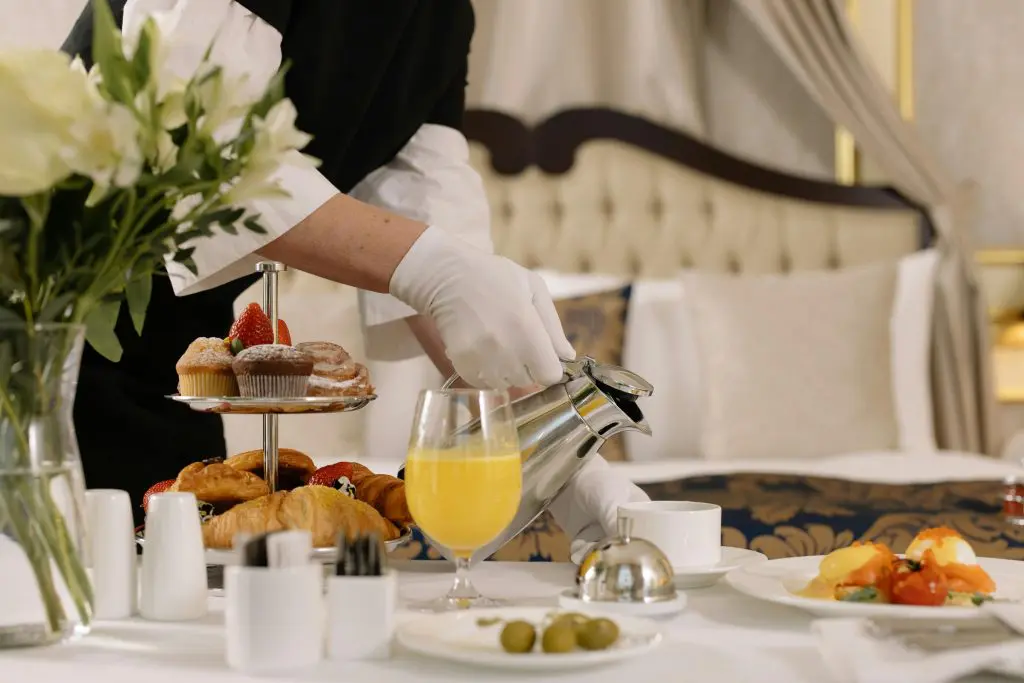
The Lodge at Ashford Castle Leads in Food Waste Innovation and Sustainability Located in County Mayo, western Ireland, The Lodge at Ashford Castle is a 19th-century villa that has become a sustainability leader in the hospitality sector. With 64 guest rooms and scenic countryside views, the hotel is part of the Red Carnation Hotel Collection. […]
Located in County Mayo, western Ireland, The Lodge at Ashford Castle is a 19th-century villa that has become a sustainability leader in the hospitality sector. With 64 guest rooms and scenic countryside views, the hotel is part of the Red Carnation Hotel Collection. Beyond its luxury offerings, the hotel is making headlines for how it’s transforming the way food is sourced, prepared, and reused — with the ambitious goal of significantly cutting food waste.
Executive chef Jonathan Keane leads the initiative, viewing even onion skins and bread crusts as opportunities rather than scraps. “Now it’s about what kind of legacy we leave behind,” he told Travel and Tour World.
This approach addresses a major challenge in hospitality: food waste. According to the United Nations, hotels and restaurants contribute to more than 25% of global food waste, much of which ends up in landfills producing methane, a potent greenhouse gas.
The Lodge has partnered with UK-based Winnow, which provides an AI-powered system that tracks all discarded food. The system photographs and records what is thrown away, sending Keane a daily report, sometimes even noting as little as two kilograms of onion skins, so chefs can adjust future prep and repurpose ingredients.
This has empowered the team to get creative: scraps are transformed into canapés, sauces, and even welcome drinks, while a biodigester converts remaining organic matter into compost for the hotel’s gardens.
“Once we start measuring food waste, we can then focus on what exactly we need to reduce,” said Vojtech Végh of Winnow.
Within a year, The Lodge cut its food waste by nearly 60%, preventing around 230,000 pounds of food from ending up in landfills. This initiative also reduced the hotel’s carbon footprint by almost 50 tons and saved more than €16,000 annually, according to Travel and Tour World.
The effort reflects a growing awareness that cutting food waste is not only about reducing environmental harm, but also about supporting economic efficiency and addressing food insecurity, a reality for 1 in 10 Americans, for example.
Chef Keane and his team are planning further sustainability projects, including:
A tunnel greenhouse
A distillery with an orchard
An aquaponics system
These additions aim to push the hotel toward full self-sufficiency, producing more of what’s consumed on-site and reducing reliance on external supply chains.
While The Lodge’s methods are high-tech, the core message applies broadly: households and other hotels can adopt similar practices. Cutting food waste at home offers benefits such as lower grocery bills, reduced emissions, and increased availability of fresh food in communities.
According to the Environmental Protection Agency, over 85% of the greenhouse gas emissions from landfilled food occur before it’s even discarded, during production, transport, and processing. By reducing waste at the source, The Lodge is not only improving its operations but contributing to a wider environmental solution.
While the progress is commendable, it’s worth recognizing that such sustainability transformations are resource-intensive. High-tech tools like Winnow, biodigesters, and aquaponic systems require initial investment, staff training, and long-term commitment, barriers that many smaller or budget hotels may struggle to overcome.
This raises questions for the broader industry: How can we scale solutions like these? Are there policies or incentives that could make such systems more accessible across the hospitality spectrum?
The Lodge at Ashford Castle offers a blueprint for sustainable hospitality, combining culinary creativity, smart technology, and ecological awareness. As they work toward full self-sufficiency, their example shows how food waste can be transformed from a liability into an opportunity for innovation, savings, and sustainability.
Ireland, known for its natural beauty and agricultural heritage, faces increasing pressure to align tourism with climate resilience. The Lodge at Ashford Castle contributes to this goal by demonstrating regenerative practices that enrich the land instead of depleting it.
As climate change continues to impact travel patterns, with extreme weather and emissions scrutiny rising, destinations that embed sustainability at the core may hold the key to long-term tourism success.
At All-Ireland Sustainability, we’re committed to building a greener, fairer island, together. Stay informed on the latest environmental initiatives, community action, and policy developments shaping sustainability across Ireland, North and South.
👉 Sign up for our newsletter today and be the first to hear about upcoming events, expert insights, and ways to get involved.
Whether you’re a seasoned advocate or just starting your journey, new members are always welcome.
Subscribe now and be part of the All-Ireland Sustainability network.